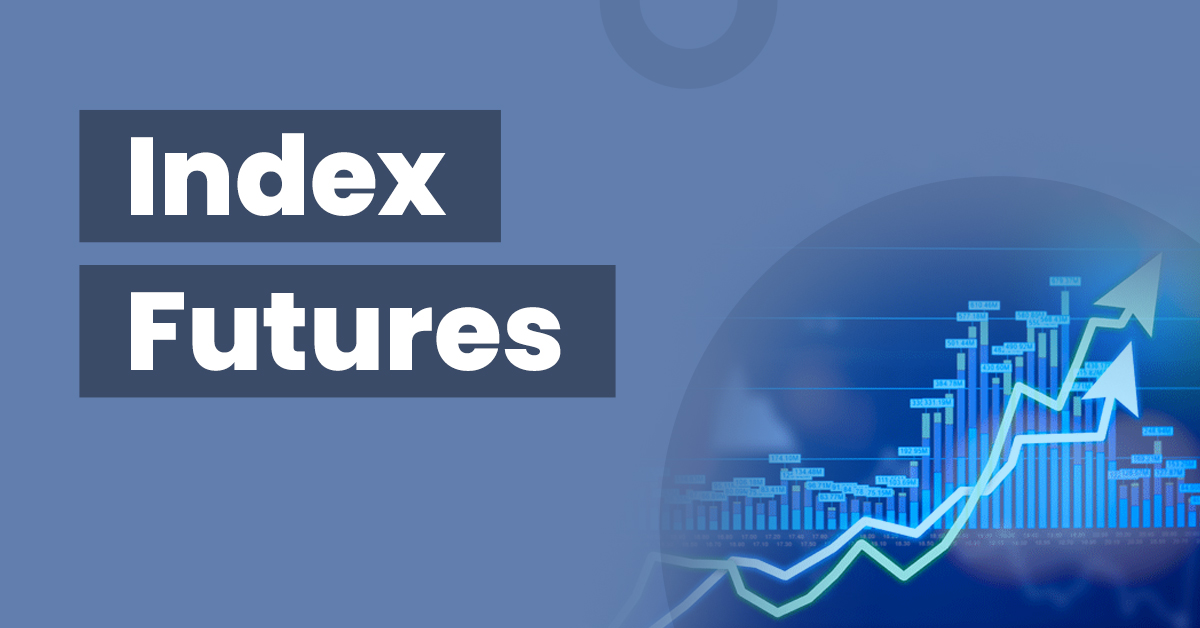Index Futures: Meaning, Example and Types 


Indices consist of benchmark indicators like Sensex and Nifty. There are general benchmark indices like Nifty 50 and theme-based indicators like Bank Nifty org Nifty IT. A specific index will consist of a portfolio of stocks adhering to certain factors like high market capitalisation, decent liquidity, etc.
Index futures represents a futures derivative contract that derives its value from an underlying market index. The settlement of these futures contracts happens on a predetermined future date and at a fixed price. Let’s discuss its different working aspects in detail.
What Is an Index Future?
It is a futures derivative contract that allows you to purchase or sell a particular index at a predetermined price on a future date. You can buy an index futures contract if you think its price will increase.
All future contracts adhere to a particular standard. It means that specifications related to the contract, like expiry, and terms of maturity, are standardised. Market participants cannot alter or modify the terms of such contracts.
How Do Index Futures Work?
Index futures contracts work just like a traditional futures derivative contract. It comes with a strike price and an expiry date. You can choose whether you want to buy or sell these derivative contracts based on future price movements of the index.
Trading on index futures started in India in 2000. These futures are tradable on India’s two primary stock exchanges, i.e., the National Stock Exchange and the Bombay Stock Exchange. Nifty and Sensex are the two leading indices that act as the underlying asset of these futures contracts. Apart from this, there are other theme-based indices as well, which allow trading in index futures.
Example of How Index Futures Work
To understand this concept better, let’s consider an example of an index futures contract.
Mr X is a bullish trader who thinks the Nifty 50 index will rise in the coming months. Therefore, he buys 2 lots of Nifty 50 index futures at a strike price of ₹14,000 with an expiry period of one month. The current spot price of the Nifty 50 index is ₹13,980. One lot consists of 50 shares.
Now, if Mr X’s prediction is right and the price of the Nifty 50 Index rises to ₹ 14,200 by the end of this month, he can exercise the futures and book a profit of ₹20,000 (₹200X100 shares). On the other hand, if the Nifty Index remains flat and hovers around ₹14,000 by the end of the month, Mr X will neither incur any profit nor loss after exercising the contract.
However, if Nifty 50 falls to ₹13,800, it means that Mr X’s prediction has gone wrong. In this situation, he has no choice but to exercise the futures contract at his entry price. Therefore, the total loss in this situation will stand at ₹20,000.
What Are the Types of Index Futures?
Here are various types of indexes that act as underlying assets for index futures contracts:
- Nifty 50: It consists of the top 50 stocks of the National Stock Exchange’s flagship Nifty index.
- Nifty IT: The stocks of different information technology companies make up this underlying index. The performance of these futures contracts depends on the overall performance of the IT sector.
- Bank Nifty: The stocks of some of the largest banking companies trading on the NSE make up the components of this index. Again, just like Nifty IT, the performance of the overall banking sector shall determine how well Bank Nifty index futures can deliver.
- S&P Bharat 22 Index: This particular index has stocks of the top 22 Central Public Sector Enterprises.
- S&P BSE Sensex: The underlying security of these future contracts consists of the top 30 stocks trading on the Bombay Stock Exchange’s Sensex.
- S&P BSE Sensex 50: This underlying index has a portfolio of the top 50 stocks trading on the Bombay Stock Exchange.
Final Word
Index futures are a popular choice among investors because of the potential for high returns, however, they also come with high risks as these derivative contracts have a limited window for execution. Before investing in this segment of derivatives trading, it’s advisable to perform a comprehensive market analysis and align your investment objectives with the decision.
Frequently Asked Questions
What is the difference between commodity futures and index futures?
This type of trading is highly liquid, and unlike traditional equities, trading in these happens quickly and efficiently. Moreover, regulatory mechanisms of derivative futures trading are simple and streamlined.
What are the advantages of index future trading?
This type of trading is highly liquid, and unlike traditional equities, trading in these happens quickly and efficiently. Moreover, regulatory mechanisms of derivative futures trading are simple and streamlined.
What are the cons of index futures trading?
One of the biggest disadvantages of index futures trading is its high volatility. This enhanced volatility increases the chances of incurring heavy losses as well.
What is the settlement process of index futures?
Settlement of index futures contracts takes place in cash mode. There is no provision for the physical delivery of corresponding shares.




